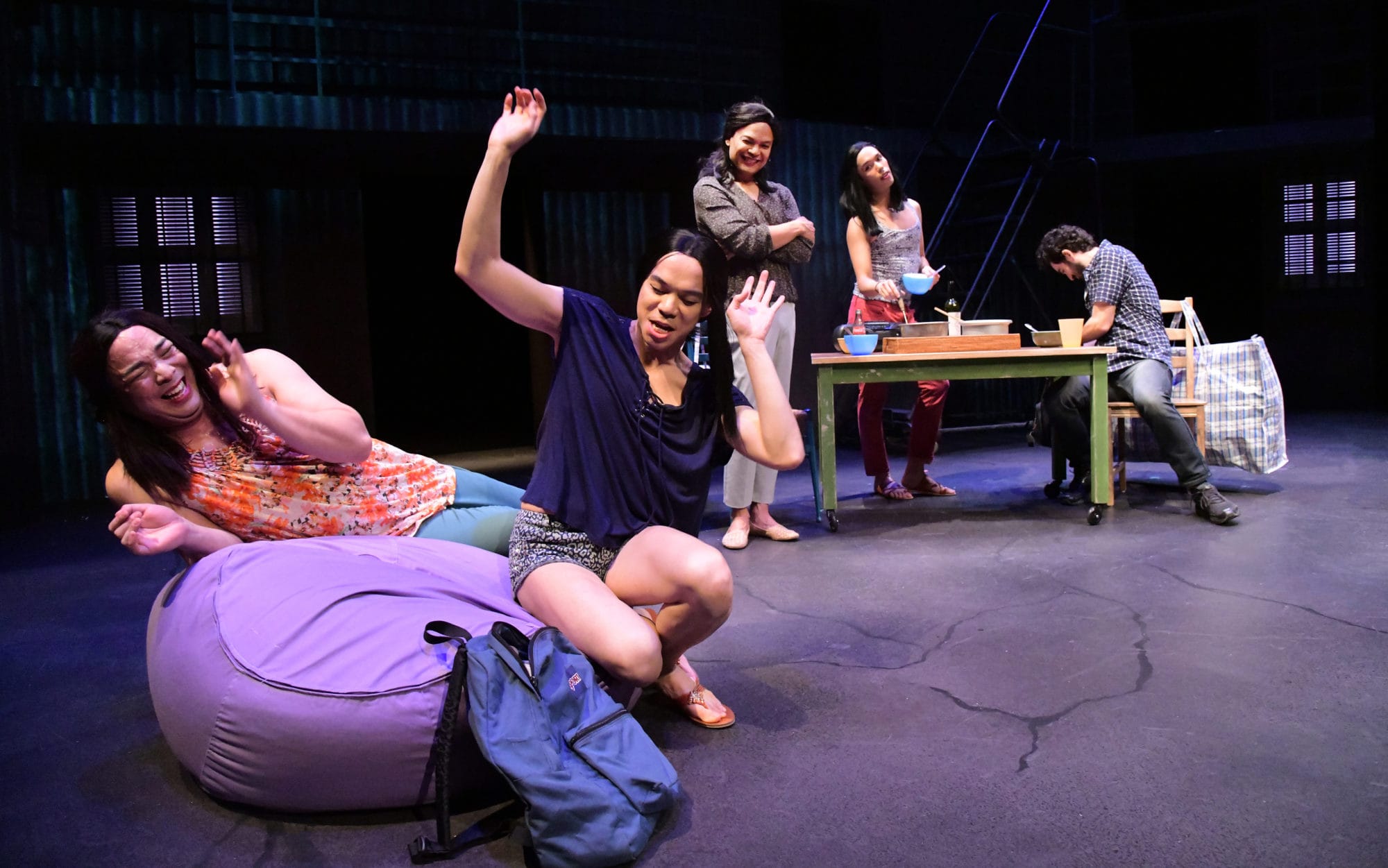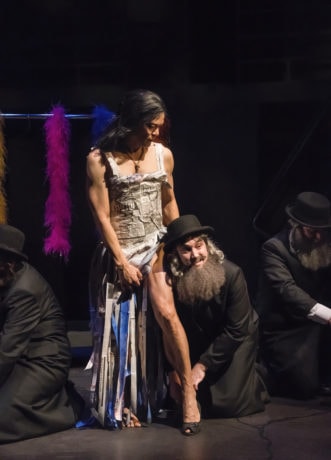From start to finish, Paper Dolls is a wildly entertaining and unapologetic dramedy filled with biting contradictions, provocative imagery, and endearing characters that you can’t help but root for. Adapted for the stage in 2013 by Philip Himberg, the production has a cinematic quality that pays homage to the award-winning documentary by Tomer Heymann on which it is based.

Set in 2004, the story follows the lives of five Filipino men working as caregivers to elderly Orthodox and Chasidic men in Tel Aviv, Israel. One night a week they take respite from their work to headline a drag show. Through Broadway veteran Mark Brokaw’s direction, this two-hour play moves at a brisk pace, with fluid transitions and no blackouts. There’s action at every turn, even in the quiet moments. The entire ensemble cast weaves in and out of scenes, set changes, and costumes both flawlessly and with an element of surprise, from quick-witted one-liners to colorful song and dance numbers.
Paper Dolls may have a strong comedic flare, but the journey from one laugh to the next is no cake-walk. The jokes in this play are used as tools to reveal social paradox and create a comfort level for the audience to engage a series of controversial subjects, such as immigration, masculinity, sexual orientation, gender identity, and cultural exploitation, among others. Moreover, there are a good number of jokes that you probably won’t understand given that they’re specific cultural references and/or spoken directly in Hebrew or Tagalog. You’ll feel like an outsider for a moment and then the story will reel you back in.
Sally, Cheska, Zhan, Jiorgio and Chiqui (played by Ariel Felix, Rafael Sebastian, Evan D’Angeles, John Norman Schneider and Kevin Shen, respectively) are the Paper Dolls. They share a playful chemistry and kinship that keep the audience invested in their story. On paper, the dolls appear to be carbon copies of the same person – a Filipino, gay, transgender, migrant worker employed as a home nurse in Tel Aviv – but it is precisely when their similarities are placed side-by-side that we see their individuality and humanity shine through.
One well-executed example of this is a scene where the dolls are discussing gender reassignment surgery. They each have a distinct personal preference. Zhan (D’Angeles) wants nothing more than to truly feel like a woman, while Cheska (Sebastian) is content with his body and doesn’t want to change. The scene is acted with such skill and fluidity that it helps dispel any notion that the Paper Dolls, and by extension the transgender community, are a monolith. Further, the tone of this scene isn’t heavy or uncomfortable, nor is the conversation belabored. Yet, the audience is clearly reminded that the Paper Dolls are people whose desire for love and happiness, and pursuit to become the most authentic versions of themselves, mirror our own. This gift of insight into the transgender community’s experience and daily struggle is artfully woven into the broader story arc without overpowering it.
Another unique feature of this play is that there isn’t a romantic story present to drive the action. Instead, other intimate bonds of companionship and family anchor the narrative, the strongest of which is Sally’s friendship with her employer, Chaim (played by Chris Bloch). There’s a deep respect and fondness between them that Chaim’s daughter, Adina (played by the talented Lisa Bruneau), attempts to disrupt. Adina eventually grows in compassion and understanding, but not without first attempting to shame Sally for dressing as a woman. Ariel Felix delivers a sublime performance as Sally. In his hands, Sally is regal, witty and endearing.

Masculinity is explored through the lens of culture and religion. Etai (played by John Bambery) is a young Israeli man who becomes fascinated with the Paper Dolls and requests to produce a documentary about their lives. In so doing he reveals that he had prior sexual experiences with men but would never dress up as a woman because “men have to be men.” He believes this distinction makes him better than the dolls. His journey of transformation throughout the play is fascinating to watch, and in some ways echoes the transformation that Adina undertakes.
Jiorgio (Schneider) recalls painful memories of physical abuse that he and his brother, Chiqui (Shen), suffered at the hands of their father, the person who was supposed to model masculinity for them, thus implying the existence of a huge rift in his family around that topic. Sally confronts an obstacle in gender identity during a visit to the Holy western wall where men and women pray on different sides. The question of, “Which side should he choose?” is a tense moment for both the audience and Sally to contemplate.
Irony and symbolism are strong forces throughout the story, especially in terms of family, religion, and the treatment of migrant workers as outsiders. Despite their own history of persecution and experience as strangers inhabiting a foreign land, Israeli law requires migrant workers to walk around with their paper visas on them at all times and if they lose their jobs they’re instantly illegal migrants who can be deported. The fear and anxiety created by this harsh reality is the backdrop of the play and reveals in many ways why the Paper Dolls never feel truly at home or accepted in Israel.
There is a scene in the second act of the play which includes both the principal actors and the ensemble cast of Elan Zafir, Brice Guerriere, Chris Daileader, and Dallas Milholland as Chassids who assist the dolls in getting ready for an important performance. It’s not clear whether the Chassids are real or merely spirits of ancestors placed in the story to symbolize what acceptance and unity could look like, but that message hits home regardless.
The costumes (by award-winning designer Frank Labovtiz) are the sixth paper doll in the story. Dresses made of actual newspaper, sequin gowns, provocative lingerie, and attention grabbing wigs with high heels to match, all raise the entertainment value of the production to create indelible imprints of these characters in the audience’s minds. The set design (by James Kronzer) is simple and adaptable. The backdrop places the audience in the heart of a working-class neighborhood in Tel Aviv and allows our imagination to fill in the rest of the scenery.
Projections (by Sarah Tundermann) are interspersed throughout with live camera footage. There’s an occasional tech glitch where the camera freezes, but overall it gives the play a grander, more cinematic feel and creates a story within a story. Music Director William Knowles selected a collection of diverse tracks from Israeli pop songs to the R&B classic Lady Marmalade that shape the tone of the play and elevate the emotional stakes within the world we see the Paper Dolls navigate.
Overall, the most surprising aspect of Paper Dolls was the feeling that hit me when I arrived home, kicked off my shoes, and realized that I’d never seen anything like that before. That aha moment instantly triggered an encore performance of the play in my mind. As I delved back inside the story, it’s themes, symbolism, and universality took hold of my senses with deeper resonance.
Running Time: 2 hours, with a 15-minute intermission
Paper Dolls runs through Sunday, April 29, 2018, at the Atlas Performing Arts Center, Lang Theater – 1333 H Street, NE, in Washington, DC. For tickets, call the box office at 202-399-7993 ext 2, or purchase them online.




